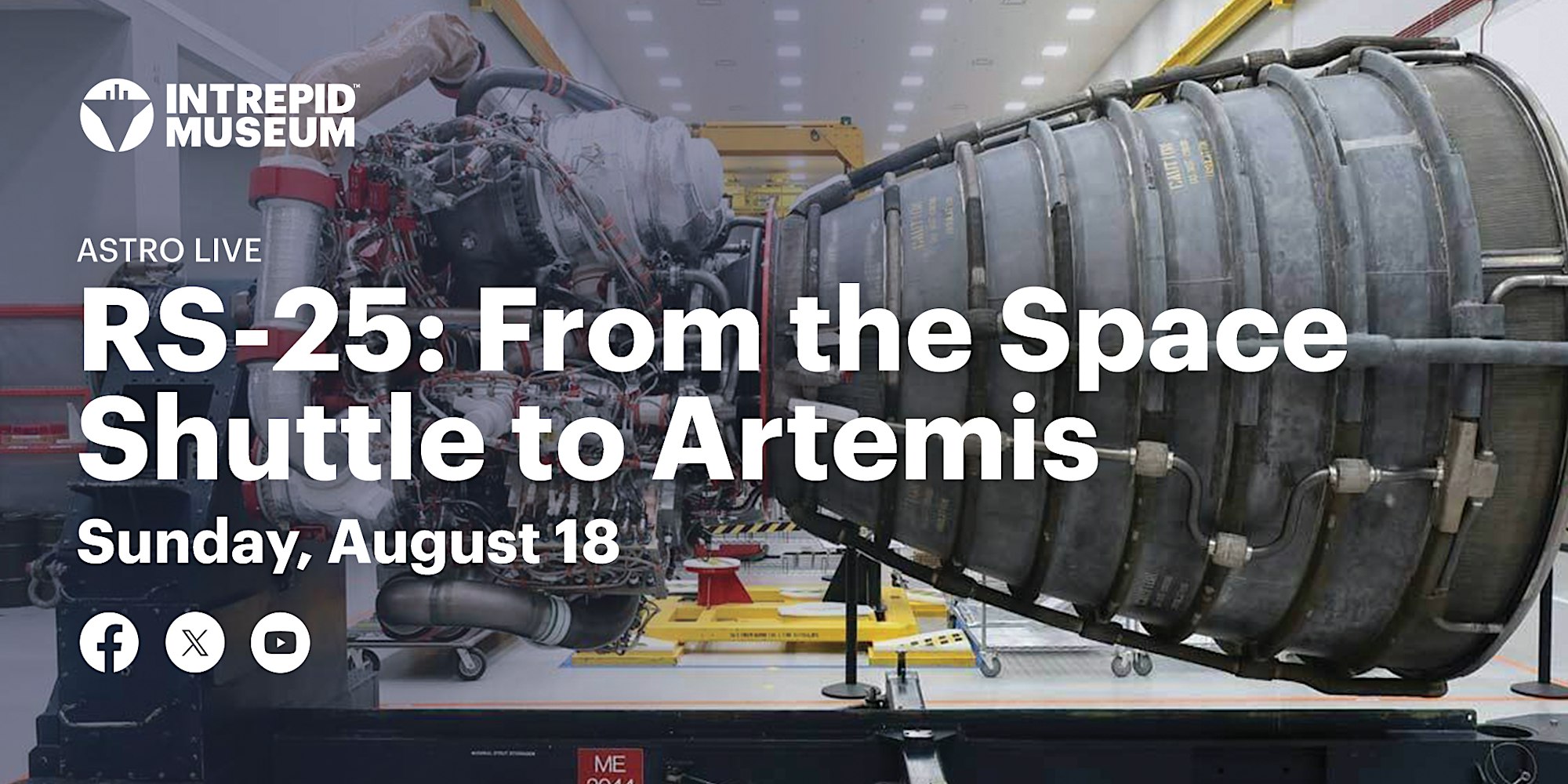
- This event has passed.
Intrepid Museum’s Astro Live
August 18 @ 3:00 pm - 4:30 pm

Join us live on Facebook, YouTube, or X.
The Intrepid Museum will present a Virtual Astro Live program on August 18 at 3:00pm ET.
NASA’s Space Launch System (SLS), the vehicle that will launch astronauts on missions to the Moon and eventually Mars, takes advantage of hardware and cutting-edge manufacturing techniques originally developed for the Space Shuttle and other exploration programs. Most notably, the vehicle uses four RS-25 engines at the bottom of the core stage. One of the most tested rocket engines in history, they powered the Space Shuttle for 135 missions over three decades, and will now help to propel SLS on its eight-and-a-half-minute climb to space.
The RS-25 is a highly efficient staged-combustion engine that combines liquid hydrogen and liquid oxygen to produce 10x the thrust of even the largest commercial jet engine. Sixteen shuttle-era RS-25 engines have undergone several design upgrades to improve durability, safety, and performance for the first four flights of SLS, the first of which took place in November 2022. Additionally, NASA has contracted with Aerojet Rocketdyne to restart production of a simplified, more affordable, and more powerful variant that will later be used on further missions.
Join us for a conversation on the incomparable RS-25 with Project Engineering Scientist Helen Lewin and Project & Component Engineer Mary Kalayjian of Aerojet Rocketdyne at L3 Harris Technologies as we discuss the engine’s journey from the Space Shuttle program to Artemis!
The event is hosted and co-produced by John “Das” Galloway, founder of the Kerbal Space Academy.
Participants:

Mary Kalayjian was born & raised in Los Angeles, California and graduated from California State University, Los Angeles where she received a bachelor’s degree in Mechanical Engineering and a bachelor’s degree in Astrophysics. She is currently working at Aerojet Rocketdyne as a Project and Component Engineer supporting the RS-25 Engine for NASA’s Space Launch System rocket. More specifically, Mary has supported the development, testing, and fabrication of 3D printed hardware and assisted with the implementation of various new manufacturing and inspection technologies. In 2019, her and her team members were chosen to receive the Distinguished Engineering Project Achievement Award by The Engineers’ Council for their efforts in successfully developing RS-25 3-D printed hardware.

Helen Lewin started working on the Space Shuttle Main Engine (SSME) Controller software team in 1987 during the return to flight effort following the Challenger accident. She then moved into flight hardware reviews, then flight performance, and finally flight readiness reviews. Following the Shuttle retirement, she worked RS-25 integration and as a business analyst for RS-25. Once Artemis I was on the horizon, she went back to flight support and worked the Core Stage Green Run test. She also led the flight support team at Canoga Park, California for the Artemis I launch. Lewin is currently working technical issues in preparation for the next few Artemis launches, including the changes needed for the new RS-25 production engines once the 16 heritage SSME engines complete their missions. Her educational background includes degrees in Biology, Electrical Engineering, and Systems Engineering.
Moderator:

Elysia Segal is the Producer of Public Programs at the Intrepid Museum, where she brings science and history to life through artistic expression and creative educational programming. She served as the project director of the Crossing the Line research and performance residency and has created and performed a number of engaging, theatrical experiences for audiences across the country. A NASA Solar System Ambassador and the namesake of main-belt asteroid 17795 Elysiasegal, she co-produces Astro Live for the museum and is the host of This Week in Spaceflight with NASASpaceflight.com.
Host:

John “Das” Galloway is a science outreach communicator who specializes in live, interactive video content. He is the creator of the Kerbal Space Academy, where he uses video games as a tool to start science and engineering conversations with viewers of all ages, and VECTORS Virtual Field Trips, which brings real-time interactive video to museums, events, and historical locations. “Das” also serves as a host and producer for NASASpaceflight.com.
Funded by: Astro Live is supported through a NASA Cooperative Agreement awarded to the New York Space Grant Consortium.

The program is also supported, in part, by the New York City Department of Cultural Affairs in partnership with the City Council, and the New York State Council on the Arts with the support of the Office of the Governor and the New York State Legislature.
